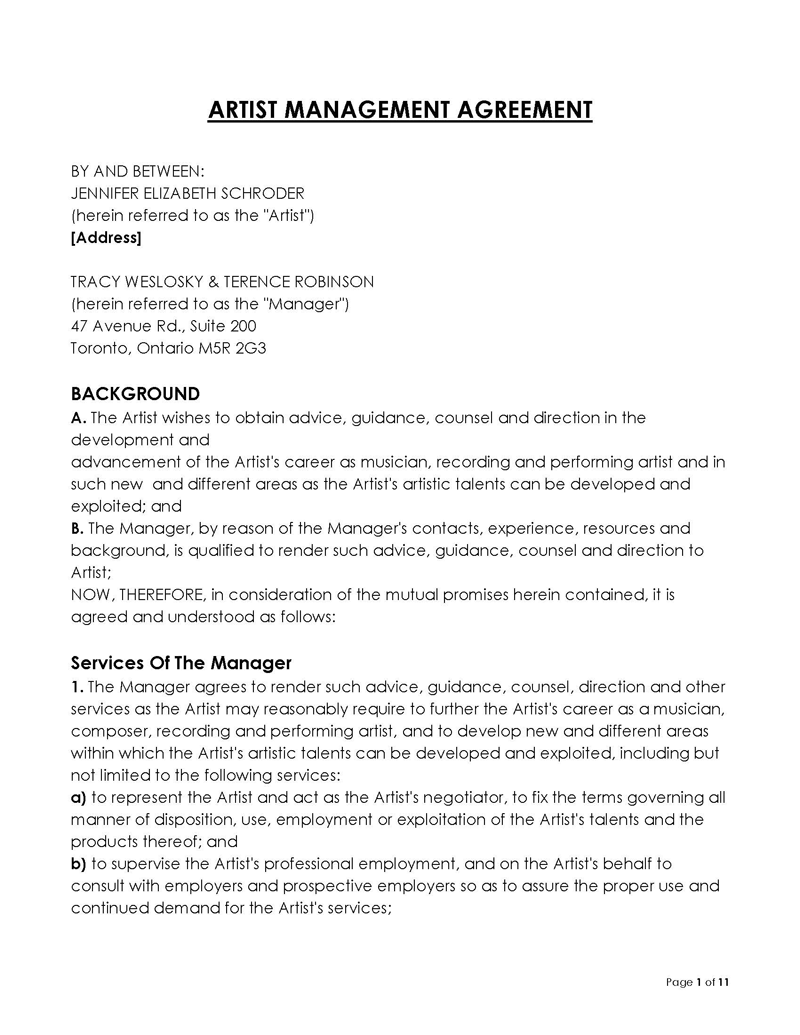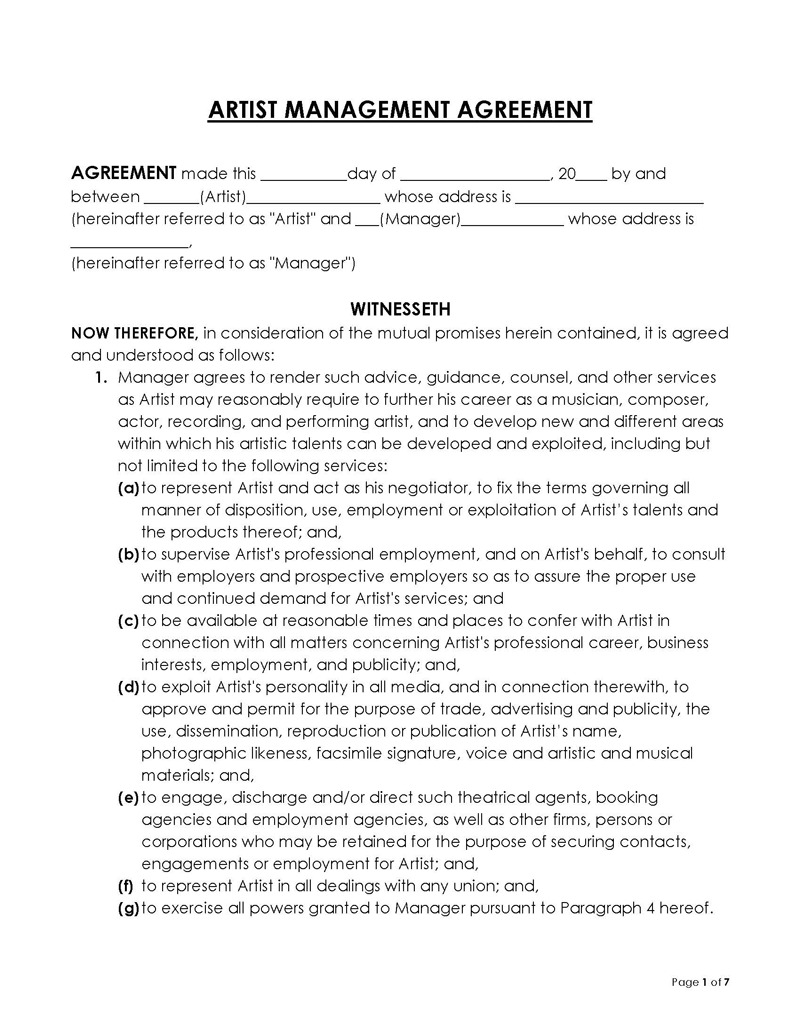An artist management contract or AMC outlines the relationship between the artist and their manager, including details on payment, responsibilities, and expectations. The specifics of the contract will vary depending on the type of artist and their unique needs and circumstances.
A manager maintains contact with clients and books appearances for an artist. This includes managing revenue streams, public relations, and scheduling interviews. They also negotiate deals on behalf of the artists. This includes things like recording contracts, publishing agreements, etc.
This article explains the different types and components of AMCs, the roles of managers and artists, and why use such a contract.
What is an Artist Management Contract?
An artist management agreement is a legal document about the relationship between an artist and their manager.
This document covers important issues such as the rights, duties, and responsibilities of each party, compensation, and more. The average compensation fee for managers is 10-20 of the artist’s total revenue. This can include all forms of revenue, including touring, merchandise, sales, and more. The fee amount can vary depending on the experience and particular contract. Artist management firms usually provide their clients with a standard contract.
Artist Management Contract Templates


Why and When Do You Need It?
An AMC is needed to formalize the relationship between an artist and their manager. It lays out the expectations and responsibilities of both parties and provides a framework for managing the artist’s career. Having a manager can be beneficial for an artist as they can provide guidance and support in many areas, including booking gigs, negotiating contracts, managing finances, and developing a long-term career strategy.
A good manager can help an artist focus on their craft and relieve them of the business-related aspects of their career, allowing them to focus on creating and performing. An AMC ensures that the artist and their manager are on the same page and have a clear understanding of their roles and responsibilities.
While most contracts will be signed as an artist starts their commercial career, they can be entered into, reviewed, and updated at any point in an artist’s career.
Types of Artist Management Agreements
The type of contract that an artist and manager enter into will depend on the goals and needs of the artist, as well as the type of career they are pursuing.
The two common types are:
Exclusive artist management contract
This type of contract allows artists to be managed by only one manager. This means the manager cannot delegate their rights and duties to another manager. However, the manager can sign multiple artists.
Non-exclusive artist management contract
Non-exclusive contracts allow artists to be managed by more than one manager. However, only one manager can manage the artist at a time. Artist management companies use such contracts because they have multiple managers and allocate them to an artist. Non-exclusive contracts are more expensive for the artist but offer more flexibility.
Information to Include in AMC
An artist management agreement should outline all the terms between the artist and the manager. It should also be updated regularly, as and when needed.
Below are the key items that must be included in the agreement:
Duration of the contract
The duration of an AMC can vary depending on the agreement between the artist and the manager. Typically, these contracts are for a period of one to five years, but the duration can be shorter or longer depending on the specific needs of the artist and the manager.
Some contracts may also have options for renewal or termination based on certain conditions. It is important for both the artist and the manager to carefully consider the duration of the contract and negotiate terms that are mutually beneficial.
Expectations and responsibilities
In AMC, the manager is expected to take on several responsibilities to help further the career of the artist. One of the primary responsibilities is to act as a liaison between the artist and the music industry, including labels, promoters, agents, and venues.
The manager is also expected to provide guidance and advice to the artist on creative and business decisions, including marketing, branding, and negotiating contracts. Additionally, the manager is responsible for organizing and overseeing the artist’s tours, performances, and appearances, as well as managing finances, budgets, and royalties.
Finally, the manager is expected to act in the best interests of the artist at all times and maintain a good working relationship with them. These are just a few examples of the many responsibilities expected from a manager in the contract.
Management fee
The management fee is the commission received by the manager for their services. This is typically an agreed percentage of the artist’s revenue generated through any means of performance, from touring to merchandise and record sales. This can also include income from other sources, such as endorsements and appearances.
The percentage of revenue will be negotiated between the two parties, mainly between 10 and 30%. It is best to have this clause stipulate that changes to the artist’s status will not affect future commission fees.
Expenses of the manager
The expenses that the manager is responsible for should be clearly outlined. This includes the costs associated with travel, lodging, and meals incurred while the manager is working on behalf of the artist. Additionally, expenses related to the promotion of the artist, such as advertising and marketing, should also be covered by the manager.
It’s important to establish a maximum amount that the manager can spend on expenses without prior approval from the artist, as well as a process for obtaining approval for any expenses that exceed that amount. The contract should also outline how expenses will be reimbursed and the timeline for doing so.
Contract renewal
Most artists will prefer working with one manager, as long as they are competent. The contract should thus stipulate the procedure for renewing the contracts. This ensures that artists can retain reliable managers.
Signing bonus
A signing amount, also known as an advance, is an initial payment made by the record label or management company to the artist upon signing the contract. This amount is intended to cover the artist’s expenses in the early stages of their career, such as recording and touring expenses. The amount of the signing fee can vary depending on the artist’s level of experience and potential earning power.
The details of the signing amount should be clearly outlined in the contract. This includes the amount of the advance, how and when it will be paid, and any conditions that must be met in order for the artist to receive the payment. This ensures that the artist and management company have a clear understanding of their financial obligations and can work together effectively to achieve the artist’s goals.
Contract termination
There are numerous reasons why an artist might want to terminate a contract. Some reasons include the manager’s lack of professionalism, misrepresentation, or other unethical behavior. A manager will also want to terminate a contract if the artist is not producing content that they consider commercially viable or if they feel they cannot sufficiently manage their career.
Thus, stipulating the procedure for terminating a contract is necessary to avoid complications should the need arise.
Commission payments
The commission is always a crucial element in an artist management agreement. This can vary significantly between industries and different managers. The commission fee is a percentage of the revenue, which is the artist’s total revenue generated by the manager in that period. This percentage of that revenue constitutes the commission fee payable to the manager. The commission can be paid as a lump sum or an installment.
Powers granted
The “powers granted” clause is an essential aspect of the agreement. It is important for both the artist and the manager to clearly understand the extent of the power granted in this clause and to negotiate the terms to ensure that both parties are comfortable with the level of authority given to the manager.
The artist can designate some responsibilities and limit those they want to oversee themselves. The clause should also specify whether or not the manager can bind the artist to a contract with another person or company.
Sunset clause
A “sunset clause” is a provision in a contract that specifies an expiration date for the agreement. This clause sets a limit on the duration of the contract, after which the agreement automatically terminates.
The purpose of a sunset clause is to ensure that the terms and conditions of the contract remain relevant and appropriate to the parties’ circumstances. This clause can also be used to give parties an opportunity to renegotiate the terms of the contract or to provide a smooth transition to a new agreement. The specific details of a sunset clause, including the expiration date and any provisions for renewal or termination, should be clearly outlined in the agreement.
Factors to Consider Before Signing Contract
Before signing any contract, artists, and managers must be aware of the following legal, due diligence, and financial considerations:
Deal memo
A “deal memo” is a document containing the essential elements of AMC.
The deal memo provides both parties with a clear understanding of each party’s expectations and responsibilities before the actual contract is prepared. The deal memo should be prepared by independent lawyers to prevent any errors.
Management fee
The management fee should be negotiated beforehand. Even though the standard is 15-20% of the artist’s income, most managers do not earn from merchandise or songwriting royalties. This is still negotiated on a case-by-case basis, though. The contract should also highlight how business expenses will be covered to avoid misunderstandings.
Clarification about each party’s roles
Both parties should clarify what each party is expected to do or not do before entering into the agreement. This reduces the ambiguity of what each party is offering and marks the onset of the relationship. Once this is discussed and trust is established between the parties, they can proceed to negotiate other aspects of the agreement.
Duration of the agreement
There should be no ambiguity about the duration of the agreement. Having a one-year term can create flexibility for both parties because the contract can be renewed.
Violation of the agreement
It is a good idea for the manager and artist to review the terms and conditions regarding contract violations. Then, they can mutually determine penalties for it as well.
Frequently Asked Questions
The average commission for an artist manager is 15-20% of the total income of the artist. However, this percentage is negotiated between the parties when signing the contract and will vary depending on the manager’s experience, the scale of the artist’s career, and other factors.
The split may vary depending on the performer’s financial expectations, achievements, and popularity in the industry. However, the split change tends to move in the artist’s favor as revenue increases and the percentage commission remains constant. For example, 10% of $10 million is more favorable than 10% of $100,000. The split can, however, be renegotiated.
Yes, a manager can sign a contract on behalf of an artist, but it is important to ensure that the artist has given their consent and that the terms and conditions of the contract are favorable to the artist.










